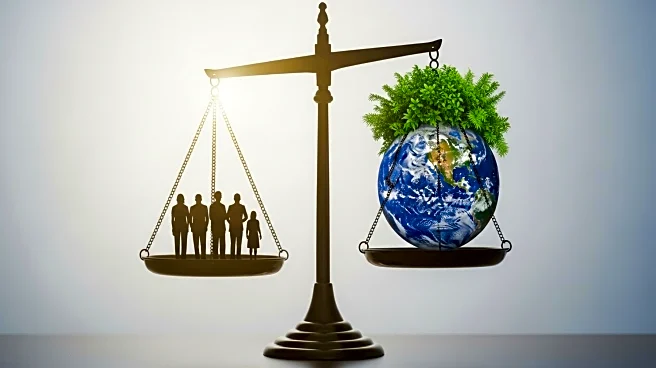What is the story about?
What's Happening?
A recent study conducted by the Potsdam Institute for Climate Impact Research (PIK) and BOKU University in Vienna has revealed that 60% of Earth's land is now outside its safe biosphere zone, with 38% in a high-risk state. The research, published in the journal One Earth, maps the planetary boundary of 'functional biosphere integrity' over centuries, showing how human demands on biomass have destabilized ecosystems globally. The study emphasizes the need for civilization to utilize the biosphere sustainably for food, raw materials, and climate protection. It highlights the growing human demand for biomass and the cultivation of fast-growing grasses or trees for bioenergy as strategies for stabilizing the climate. The research provides a detailed inventory of changes in climate and human land use since 1600, showing significant disruptions in Europe, Asia, and North America.
Why It's Important?
The findings underscore the critical need for sustainable practices to protect the biosphere and mitigate climate change. As human activities continue to divert natural energy flows for their own purposes, the risk of ecosystem destabilization increases, affecting water, carbon, and nitrogen balances. This research offers a scientific breakthrough in understanding planetary boundaries and provides impetus for international climate policy development. By linking biomass and natural carbon sinks, the study suggests comprehensive biosphere protection alongside strong climate action as essential strategies for governments worldwide. The implications are significant for policymakers, environmentalists, and industries reliant on natural resources, as they navigate the challenges of balancing human needs with ecological preservation.
What's Next?
The study calls for urgent strategies to quantify and manage the strain on the biosphere, emphasizing the importance of regionally differentiated approaches. It suggests that governments must treat biosphere protection and climate action as interconnected issues, potentially leading to new policies and international agreements focused on sustainable land use and biomass management. The research may also drive further scientific exploration into the links between biomass, carbon sinks, and climate change mitigation, influencing future environmental strategies and conservation efforts.
Beyond the Headlines
The study highlights ethical and cultural dimensions of human interaction with the biosphere, raising questions about the long-term sustainability of current practices. It suggests a need for a paradigm shift in how societies value and utilize natural resources, potentially influencing cultural attitudes towards conservation and environmental stewardship. The research may also prompt legal and policy changes aimed at protecting ecosystems and ensuring equitable access to natural resources.
















